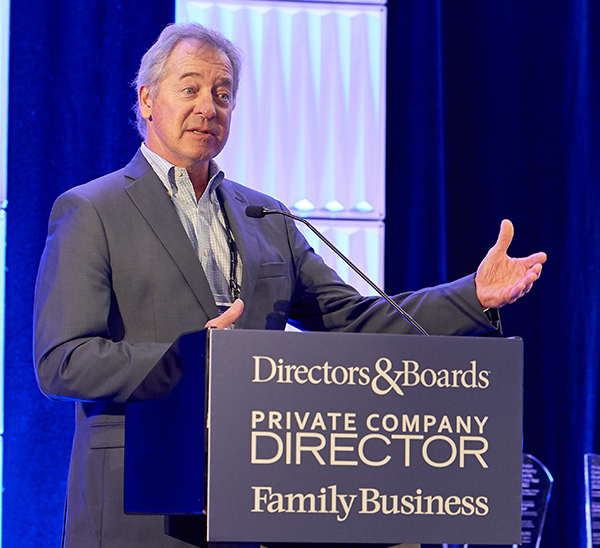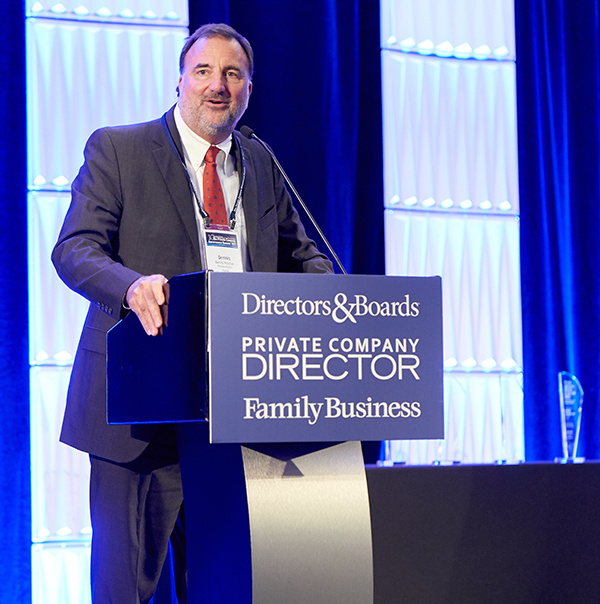The winners of the 2022 Private Company Boards of the Year Awards may vary in service offerings – operating in such areas as telecommunications, medical supplies, candies and plastic packaging – but they all have one thing in common: a commitment to stellar corporate governance.
The awards, now in their seventh year, are presented by Private Company Director, Family Business and Directors & Boards magazines at the annual Private Company Governance Summit. They were created to recognize private companies that go above and beyond legal governance requirements and commit to the highest levels of governance, whether through fiduciary or advisory boards. The awards honor the performance of the board as a whole.
The awards recognize fiduciary boards as well as advisory boards. Fiduciary board awards were categorized by company revenues and ownership type.
The Private Company Governance Summit, which recently celebrated its 10th anniversary, is the only national conference focused on the unique governance challenges faced by owners, shareholders, directors and advisory board members of closely held, family-owned and private equity-owned companies.
While nearly 20 private company boards were nominated for the 2022 Private Company Boards of the Year Awards, six stood out for their diligence, standards and best practices.
Here are the six boards chosen for this year’s recognition. Also, if you are interested in entering your board for the 2023 Private Company Boards of the Year Awards, make sure to fill out the nomination form today!
Graebel Companies Inc.
Type of Private Company Board: Advisory
Approximate Annual Company Revenues: Over $1 billion
Company Ownership: Family-owned

Graebel Companies Inc. provides global relocation services to Fortune 500 and Global 100 firms in 165 countries, helping corporations relocate their employees, teams and workspaces.
Governance highlights include:
- The board has ensured that for every challenge or opportunity the company faces, they have at least one director with the appropriate background or experience to provide informed guidance.
- Board members have served as mentors to Graebel’s executive team and have facilitated strategic relationships outside the company.
- The board has helped the company create an affiliate transaction policy and an ESG/DEI strategy.
- In 2015, the board helped the company shift its business model from moving and storage to global relocation management services. The shift included divestiture of all moving and storage assets.
Nixon Medical
Type of Private Company Board: Fiduciary
Approximate Annual Company Revenue: Under $100 million
Company Ownership: Family-owned

Nixon Medical provides medical apparel and linens serving outpatient healthcare centers.
Governance highlights include:
- The board was instrumental in facilitating the leadership and ownership succession from the first to the second generation, executive team development, strategy oversight, crisis management and improved business performance.
- The board is modeled on public company best practices: majority independent, independent chair, independent committees, independent consultants (e.g., audit, compensation), regular governance surveys and director assessments.
- Directors are seasoned executives of larger companies with public-company board experience.
- All of the board’s committees (governance, nominating, audit, compensation and president evaluation) have charters.
Just Born
Type of Private Company Board: Fiduciary
Approximate Annual Company Revenue: $100 million to $350 million
Company Ownership: Family-owned

Just Born is a third-generation, family-owned candy manufacturer that has been in business since 1923 and is known for such famous brands as Peeps marshmallow candies, Mike and Ike, Hot Tamales and Goldenberg’s Peanut Chews.
Governance highlights include:
- The board has evolved from a start-up board focused on understanding the issues facing the business to a strategic board driven toward helping the business meet its strategic goals.
- There are seven directors: one family member/shareholder, who is the chairman, and six independent directors. The chairman and CEO roles are separate. There is also a lead independent director.
- The board has played a key role in developing a foundational future vision and hiring the first non-family CEO.
- The directors have encouraged a higher level of performance through discipline in quarterly reporting, oversight of a three-year strategic plan, and challenging the management team to become more proactive in identifying and addressing key risks and opportunities.
Telamon Corporation
Type of Private Company Board: Fiduciary
Approximate Annual Company Revenue: $351 million to $999 million
Company Ownership: Family-owned

Telamon Corporation specializes in solutions for telecommunication networks, industrial assembly and supply chain financing. It is one of the largest private companies in Indiana, operating in 48 states and on three continents.
Governance highlights include:
- Board members have a good mix of personalities and experience: family business experience, start-up experience, large company experience and theoretical experience.
- The board drives the performance of the business. This takes effect in many forms, including efficiencies, employee relations, company risk, customer risk and growth strategies.
- Outside directors of the board are very transparent in their pleasure and displeasure with company performance, strategy and risk. They excel at providing guidance and recommendations that may or may not shift the CEO’s direction for the company in the short or long term.
- The onboarding process is carefully orchestrated, with new directors given information on the history of the company and where the company would like to go. A board cadence is strictly followed. Meetings include a segment on each business so board members can ask questions of leadership.
The Plastek Group
Type of Private Company Board: Fiduciary
Approximate Annual Company Revenue: $351 million to $999 million
Company Ownership: Family-owned

The Plastek Group is a manufacturer of plastics packaging with 2,300 employees and manufacturing sites in the U.S., the U.K., Brazil and Mexico. The company founded in 1956, specializes in industrial design, product and package development, and mold design and build.
Governance highlights include:
- To prepare for the formation of the board, all the family owners went through an 18-month governance class offered by Loyola University Chicago’s Family Business Center.
- Unlike many other family businesses in the second generation, Plastek has been very proactive in forming a board — and that board has made significant achievements since its first meeting in March 2020.
- When the board was convened, the directors realized the company’s two immediate challenges: lack of a succession plan and lack of a strategic plan. Committees were organized to develop the respective plans, which are now being implemented by management.
- The board has established three committees: human capital and compensation, audit and finance, and nominating and governance. All committees have charters.
Schnuck Markets Inc.
Type of Private Company Board: Fiduciary
Approximate Annual Company Revenue: Over $1 billion
Company Ownership: Family-owned

Schnuck Markets is a grocery company based in St. Louis, Founded in 1939, the company now includes over 100 stores in Missouri, Illinois, Indiana and Wisconsin.
Governance highlights include:
- Schnuck Markets converted from an advisory board structure to a fiduciary board in 2018. The board, first established in 1991, went from being dominated by family members as an advisory board to a five-member independent director/four-member family director breakdown.
- The board has assisted the company in the development of a stronger strategic planning process.
- The team of directors has documented policies in place for board refreshment, retirement age, inclusion of at least one family member of the “coming generation,” regularly scheduled board and committee meetingsand senior executive/CEO review processes.
- All key transactions and initiatives are approved by the board.

